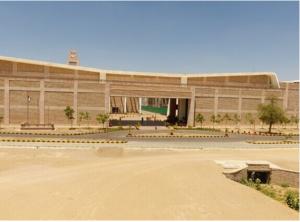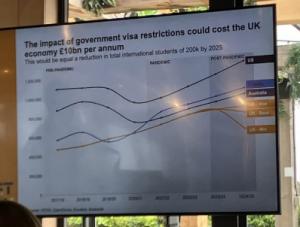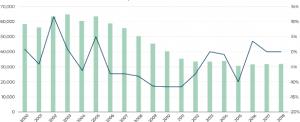Students from Sub-Saharan Africa are being recruited in their numbers and the competition is increasing, with indicators predicting that the region’s 430,000 outward mobile students will swell and double by 2050.
This is according to Campus France, a public institution that promotes French higher education abroad.
In a study, Les grandes tendances de la mobilité étudiante en Afrique Subsaharienne, or in English, ‘The major trends in student mobility in Sub-Saharan Africa’, the organisation noted that the desire for qualifications with worldwide recognition is driving students from Sub-Saharan Africa to pursue university education outside their countries of origin.
Highlighting the skyrocketing of mobile students from Sub-Saharan Africa, the report noted that outbound students from the region increased by 21% between 2016 and 2021.
But, whereas, at 27%, Europe holds the largest share of Sub-Saharan African students, at country level, France is the main host of students from the region, enrolling 92,000 students, followed by the United States (41,700), South Africa (30,300) and the United Kingdom (27,800).
According to Judith Azema, the Campus France director of communication, France has a solid reputation in Africa, thanks to the quality, the performance and the lower cost of its universities and other tertiary institutions.
“Ease of communication linked to French as a common language spoken by a large number of students from many West African countries has also made France an attractive destination for mobile students from Sub-Saharan Africa,” Azema told University World News.
According to Campus France, the growth in the number of Sub-Saharan African international students in France increased by 40% between 2016 and 2021. Currently, with 15,264 students, Senegal has the highest number of outbound students from Sub-Saharan Africa in France followed by Côte d’Ivoire (10,725) and Cameroon (9,037). Other countries with more than 5,000 students studying in France are Congo (6,864), Gabon (5,687) and Benin (5,072).
Factors aiding mobility
Explaining the reasons that make many students from West Africa travel to France for higher education, Désiré Nassa, a professor of geography at Félix Houphouët-Boigny University in Abidjan, Côte d’Ivoire, cited historical ties, geographical proximity and prestige of French universities as key drivers that inspire many African students to gaze towards France.
“Superior university resources, quality of teaching and affordable tuition fees in comparison to other destinations abroad, as well as the search for a better quality of life also attract many West African students to France,” Nassa told University World News.
But, commenting on the recent rise of mobility of African students to France, especially from West Africa, Franck Dago, a lecturer of sociology at University Felix Houphouët-Boigny, attributed the growth to a deliberate political strategy by the French government.
“Since 2018, the French government had been implementing Bienvenue en France or, in English, ‘Welcome in France’, a policy which aims to improve the competitiveness and the attractiveness of their higher education system,” Dago told University World News.
According to Dago, the new strategy borrows heavily from the colonial heritage when the French colonial administration used to build local elites by sending African students to study in France.
“But, today, French authorities consider student mobility as a soft power tool, as students that graduate from French universities would be more sensitive to French interests,” said Dago.
Dago, however, credited Campus France for its aggressive campaign to attract African students to universities and other tertiary institutions in France.
He stressed that it is not just a one-way traffic as, on their side, most students from Sub-Saharan Africa think a degree or any other higher qualification from France would improve their chances of employment and career development back home.
In this regard, Nassa pointed out that the French higher education system has continued to attract students, not just from the former French colonies, but also from the anglophone countries that would like to improve their professional status by becoming multilingual.
Competition intensifying
But Campus France says competition for mobile students from Sub-Saharan Africa is rising from other destinations. “We are not the only ones to see the potential of Sub-Saharan Africa, as the United States, South Africa and the United Kingdom are very much present in the region,” Renato Bustamante, also from Campus France, told University World News.
In effect, in the past two decades, there had been competition for students from Sub-Saharan Africa as a result of demographic forecasts that estimate a spectacular rise in the college-aged population that is expected to double by 2050.
But, only a small fraction of this cohort is enrolled in higher education in the region. According to the UNESCO Higher Education Global Data report issued last year, the gross enrolment ratio for higher education in Sub-Saharan Africa stands at 9%, as compared to the global average of 40%.
Still, capacity issues and quality demands in their domestic higher education systems are also some of the main push factors for Sub-Saharan African students, according to ICEF Monitor, a platform that features market intelligence for international student recruitment globally.
Amid efforts to bypass such issues, higher education students from Sub-Saharan Africa have become highly mobile with 4.8% of them studying outside the region, compared to 2.75% on average worldwide, according to the study issued by Campus France. For now, Sub-Saharan students represent nearly 7% of all degree-seeking students outside their countries of origin.
To attract higher education students from Sub-Sahara, some countries have implemented policies that focus on how to increase the outflow of students from the region. According to Campus France, countries such as China, Canada and Germany have made progress.
Turkey with 19,700 students, has almost tripled the number of Sub-Saharan students it hosts and is experiencing the strongest growth that rose by 183% between 2016 and 2021, effectively becoming one of the most popular destinations in Europe for students from the region.
For now, only 20% of outbound students in Sub-Saharan Africa have chosen to stay in the region and most of them are hosted in South Africa and are predominantly from Zimbabwe and other countries that are members of the Southern African Development Community, or SADC, a regional economic bloc comprising 16 member states that include Angola, Botswana, Comoros, Democratic Republic of the Congo, Eswatini, Lesotho, Madagascar and Malawi.
Other member countries within the group are Mauritius, Mozambique, Namibia, Seychelles, South Africa, Tanzania, Zambia and Zimbabwe.
Morocco
Morocco is another attractive African destination for students from Sub-Saharan Africa, as its share increased by 67% in five years and is currently hosting 19,874 students from the region, mostly from Mali, Côte d’Ivoire, Guinea, Gabon, Senegal and Mauritania, in that order.
So far, Nigeria is arguably the country in Sub-Saharan Africa with the highest number of its students studying abroad. According to Campus France, there are more than 71,700 Nigerian students studying abroad, mostly in universities in the United Kingdom and the United States, that account for about 17% of all outbound students from Sub-Saharan Africa.
Cameroon, with its 27,000 outbound students, is in second position as a sending country in Sub-Saharan Africa, while Zimbabwe (19,124) is in the third position.
To date, there are mixed reactions about the mobility of tertiary students from Sub-Saharan Africa, taking into account that, whereas 235 million students were enrolled in higher education in the world in 2020, only 9% of them were from Sub-Saharan Africa.
Granted that the mobility allows students to pursue opportunities out of the region, many of them don’t return, thus depriving their countries of the critical human resource capacity needed for development.
Further, with some top destinations for mobile students from Sub-Saharan Africa implementing talent pool recruitment policies, it appears that the region will continue to suffer brain drain and, possibly, will have to wait much longer to achieve its development ambitions.

Source link: https://www.universityworldnews.com/post.php?story=20230301202553233















































































































































































































